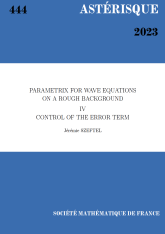Équations d'ondes sur des fonds cosmologiques
Linear systems of wave equations on cosmological backgrounds with convergent asymptotics
- Consulter un extrait
- Année : 2020
- Tome : 420
- Format : Électronique, Papier
- Langue de l'ouvrage :
Anglais - Class. Math. : 35L10, 35L15, 35Q75, 53B30, 53C50, 58J45, 83F05
- Nb. de pages : xi+510
- ISBN : 978-2-85629-926-5
- ISSN : 0303-1179 (print), 2492-5926 (electronic)
- DOI : 10.24033/ast.1123
Cet article concerne les systèmes linéaires d'équations d'ondes sur des fonds cosmologiques asymptotiquement convergents. Cette condition de convergence porte une version renormalisée de la deuxième forme fondamentale et est en particulier vérifiée pour les solutions de type Kasner. Le résultat principal de l'article est la démonstration d'estimations d'énergie optimales. De plus, nous obtenons aussi les asymptotiques des solutions et montrons que les premiers termes dans le développement asymptotique peuvent être prescrits, même dans certaines situations où les asymptotiques ne sont pas convergentes.
Lorsque les coefficients des dérivées spatiales décroissent exponentiellement, il est naturel et souvent admis en première approximation que l'on peut négliger leur contribution dans les équations. Néanmoins, nous montrons que cette heuristique est, en géneral, incorrecte en construisant des exemples d'équations telles que
1) les coefficients des dérivées spatiales de l'équation décroissent exponentiellement
2) les coefficients des dérivées en temps sont constants
3) l'énergie de chaque mode individuel des solutions
décroit exponentiellement
4) l'énergie des solutions génériques croit en $\exp[ \exp (t) ]$.
Lorsque les coefficients des dérivées spatiales croissent exponentiellement, les modes de Fourier oscillent avec une fréquence qui croît exponentiellement. Pour obtenir des asymptotiques, nous fixons un mode et considérons l'évolution sur une période. De plus, nous remplaçons l'évolution (sur une période) avec une multiplication matricielle. Nous ne pouvons pas calculer explicitement ces matrices, mais déterminons des approximations. Pour obtenir des asymptotiques, il faut alors calculer un produit matriciel infini avec pour chaque facteur uniquement une approximation. Néanmoins, nous obtenons des asymptotiques détaillées. Plus précisément, malgré le comportement oscillatoire et la croissance des fréquences, il est possible d'extraire un comportement global (croissance/décroissance). De plus, nous sommes également en mesure de spécifier les asymptotiques principales.


